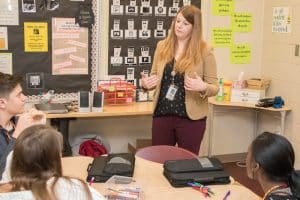Bless the Mess: A Teacher’s Reflection on Student Voice and Choice
Education Domain Blog
“When I was in your class, I never felt like my voice or my opinions weren’t heard. I always felt like your classroom was a safe place to where I could talk to you if I needed to or just be comfortable. I had to do the assignment, and most teachers would tell you exactly what to do but with my class at least you let me kind of explore how I wanted to do the things I had to do.” – Former English 9 student

Testimonials like this are why I do what I do every day. I have been in the classroom for going on 10 years, and the most powerful thing I have learned is that if you want engagement, managed behavior, growth and achievement, students must have choice and voice. Though I had experimented with choice and voice a couple of times over my career, it wasn’t until I attended the iNACOL Symposium in fall 2017 that I had the impetus to make it a pedagogical focus. I, like many other educators, was terrified that I would lose control over my classroom. I attended a session led by educators and administrators from Holmes Elementary School in Boston, and they inspired me to “Bless the Mess” and not worry about having absolute control.
Listening to the student panel at the Symposium also changed my view of my classroom. I alternate between calling my students “my students” and “my scholars.” I present myself simply as a guide and moderator instead of the only important voice in the classroom. I was especially motivated by a young man on the panel who had spent most of his time in trouble while in school; he was labeled as a troubled kid. When he moved to a school that truly placed students in the center of learning and empowered them as directors of their learning, he became one of the top students in the school. Watching the students on the panel brought me to tears and made me determined to change lives in my own school.
I do all sorts of things to build students’ confidence in sharing their voice in class. On day one, I introduce classroom norms, and the one on which I put the greatest emphasis is that each member of our class has value and a voice. Students have an assignment where they reflect on the norm and set goals, and never have I had a student who did not appreciate the value of this norm. When we read texts, I ask questions that challenge the status quo. After one brave scholar answers the question, others chime in. I often have to provide several minutes of wait time as students are usually not used to this environment. Each student’s opinion is valued, and I teach students how to respectfully challenge each other’s ideas. I encourage them to challenge my ideas as their learning moderator, too, so that all of us may learn from each other.
Student choice goes along with student voice to affect engagement, too.
“This [choosing a text] was great. I liked how we got to choose because it doesn’t make me feel like I have to do this, or I have to finish this. Giving students a choice makes students more happy with what they’re learning. If we get to choose and it’s about something that we like then it will be a much more enjoyable class. If you were to be teaching something then students can understand it better if they can relate it to what they like.” – A current student
I give students choices on texts as well as assignments to show mastery of standards. I let them choose between projects at the end of a unit; I let them choose which questions to respond to for texts; I create assignments that are wide-ranging enough that they can read whatever they want and still complete the assignment. I have found success in the classroom with giving students choice.
For us to have true student choice and voice in the classroom, we need to rethink how we hold schools and teachers accountable. Standardized testing can often severely limit teachers from branching out and agreeing to “Bless the Mess” because of fear of failure. The power to change lives with people affected by the over-testing: teachers, district administrators, parents, family members, employers, higher education professionals. My point is that everyone is affected, and policymakers need to feel pressure from all of us to change how students are assessed. Students are not robots, and I fear that our culture of standardized testing forces teachers to make students into test-taking machines. In the past, mine have acted as those machines, but students at iNACOL inspired me to take a risk. They encouraged me to realize that my students will perform at even higher levels if they have choice, and my class will be fun and engaging not just for my scholars, but for me, too.
“Bless the Mess” has become my mantra on days I try new things. I encourage you to give your students a chance to direct their own learning. You will not be disappointed.
About the Author
Rhiannon Dunn (@dunnshhs) is an English 9 teacher at Science Hill High School nestled in the mountains of East Tennessee. She has been in public education for 12 years, nine and a half of which have been spent in the high-school English classroom. She obtained her bachelor’s degree in Mass Communication from Tusculum College and her M.Ed. in Secondary Education from Milligan College. She has worked with the Tennessee Department of Education and the Tennessee Textbook Review Committee. She currently serves as a Technology Teacher Leader for her district, Johnson City Schools.